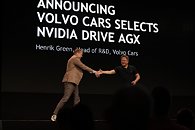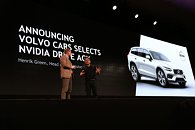NVIDIA has long worked in the field of artificial intelligence applied to self-driving, and the fruits of that work are beginning to appear. Volvo has announced an alliance with NVIDIA whereby the carmaker will use NVIDIA'S Drive AGX Xavier computer in its next generation of vehicles. This system allows level 4 autonomy in controlled areas, although initially they will restrict their capacity to "Level 2+" that will more or less bring it up to the level offered by the current Tesla models.
The first Volvo cars to integrate this system will be available in the early 2020s, and will not only monitor the vehicle's surroundings but will also follow the driver's head and eye movements to detect possible events that the car's sensors have failed to capture. Volvo is not the first to reach such an agreement with NVIDIA: the company has already reached an agreement with Volkswagen earlier this year to take advantage of its Drive IX platform, and other customers such as Uber and Daimler have also made use of NVIDIA solutions in this field.



View at TechPowerUp Main Site
The first Volvo cars to integrate this system will be available in the early 2020s, and will not only monitor the vehicle's surroundings but will also follow the driver's head and eye movements to detect possible events that the car's sensors have failed to capture. Volvo is not the first to reach such an agreement with NVIDIA: the company has already reached an agreement with Volkswagen earlier this year to take advantage of its Drive IX platform, and other customers such as Uber and Daimler have also made use of NVIDIA solutions in this field.



View at TechPowerUp Main Site






 )
) , the cost of both electricity and the batteries themselves will skyrocket. I think none of us can really predict how much, but it will be tremendous. Its already visible in battery land. No matter what solution you choose (battery lease, swap-in / swap-out systems, etc.), batteries do wear out and need replacing. A petrol tank does not.
, the cost of both electricity and the batteries themselves will skyrocket. I think none of us can really predict how much, but it will be tremendous. Its already visible in battery land. No matter what solution you choose (battery lease, swap-in / swap-out systems, etc.), batteries do wear out and need replacing. A petrol tank does not.

 PX is a project, SDAV aren't ...
PX is a project, SDAV aren't ... 


